Mercedes EQT vs VW Caddy Compact Van – Differences & prices compared
Compare performance, boot space, consumption and price in one view.
Find out now: which car is the better choice for you – Mercedes EQT or VW Caddy Compact Van?
The Mercedes EQT (High Roof Estate) comes with a Electric engine and Automatic transmission. In comparison, the VW Caddy Compact Van (Cargo Van) features a Petrol, Diesel or Plugin Hybrid engine with Manuel or Automatic transmission.
When it comes to boot capacity, the Mercedes EQT offers 551 L, while the VW Caddy Compact Van provides – depending on how much space you need. If you’re looking for more power, decide whether the 122 HP of the Mercedes EQT or the 150 HP of the VW Caddy Compact Van suits your needs better.
In terms of consumption, the values are 19.50 kWh per 100 km for the Mercedes EQT, and 0.50 L for the VW Caddy Compact Van.
Price-wise, the Mercedes EQT starts at 30700 £, while the VW Caddy Compact Van is available from 25800 £. Compare all the details and find out which model fits your lifestyle best!
Mercedes EQT
The Mercedes-Benz EQT represents a new chapter in the world of electric vehicles, seamlessly combining elegance with practicality. Its interior offers a sophisticated design, featuring premium materials and advanced technology to ensure a comfortable driving experience. On the road, the EQT impresses with its smooth handling and efficient electric powertrain, making it a strong contender in the growing market of eco-friendly family cars.
details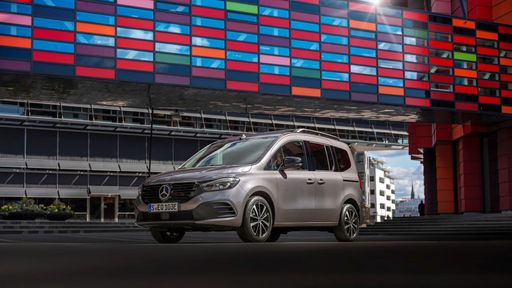 @ Mercedes-Benz
@ Mercedes-Benz
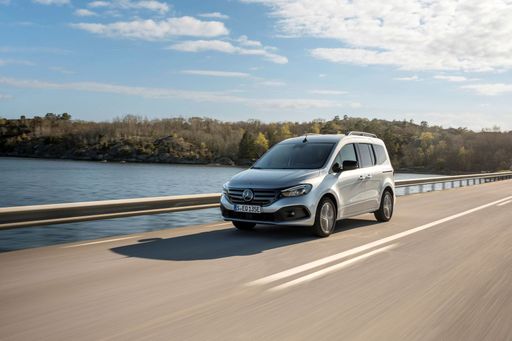 @ Mercedes-Benz
@ Mercedes-Benz
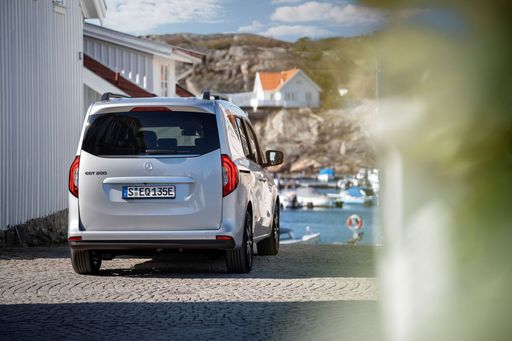 @ Mercedes-Benz
@ Mercedes-Benz
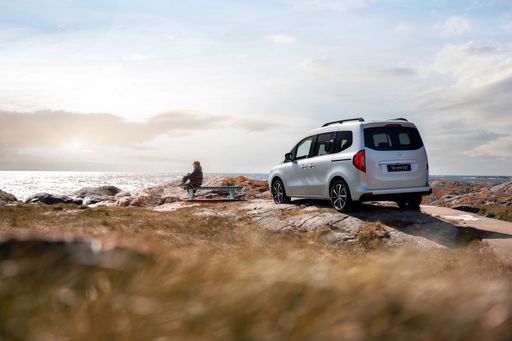 @ Mercedes-Benz
@ Mercedes-Benz
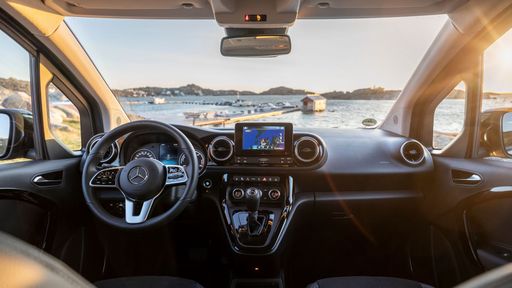 @ Mercedes-Benz
@ Mercedes-Benz
VW Caddy Compact Van
The VW Caddy small van is a versatile option for those seeking a practical and efficient transporter. With its sleek design and innovative features, it caters well to both business needs and everyday convenience. The interior is thoughtfully designed, offering comfort and ample space for cargo or passengers, making it a reliable choice for various tasks.
details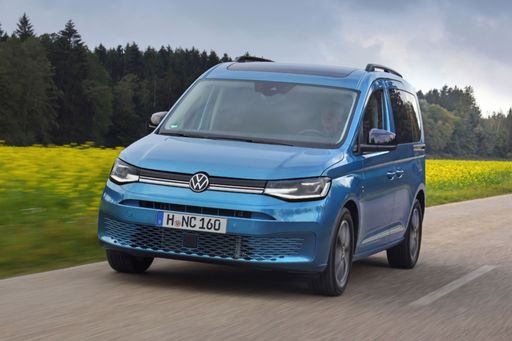 @ vwpress
@ vwpress
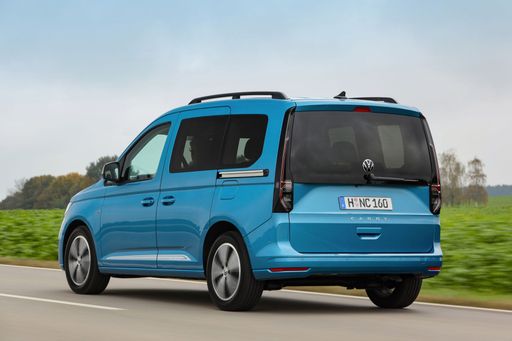 @ vwpress
@ vwpress
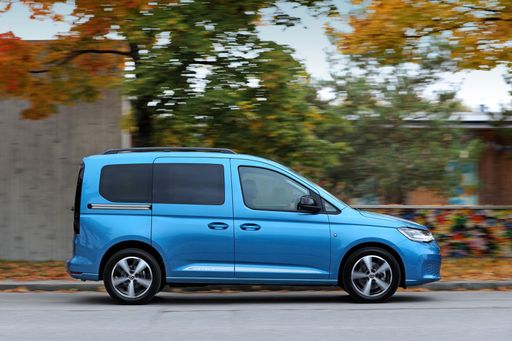 @ vwpress
@ vwpress
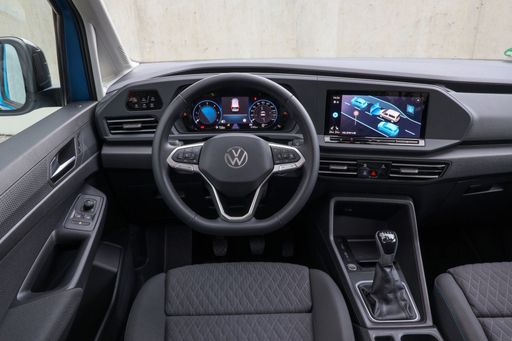 @ vwpress
@ vwpress

|

|
|
|
|
Costs and Consumption |
|
|---|---|
|
Price
30700 - 35000 £
|
Price
25800 - 42300 £
|
|
Consumption L/100km
-
|
Consumption L/100km
0.5 - 6.8 L
|
|
Consumption kWh/100km
19.5 - 20.8 kWh
|
Consumption kWh/100km
-
|
|
Electric Range
265 - 278 km
|
Electric Range
117 - 120 km
|
|
Battery Capacity
45 kWh
|
Battery Capacity
19.70 kWh
|
|
co2
0 g/km
|
co2
11 - 154 g/km
|
|
Fuel tank capacity
-
|
Fuel tank capacity
50 L
|
Dimensions and Body |
|
|---|---|
|
Body Type
High Roof Estate
|
Body Type
Cargo Van
|
|
Seats
5
|
Seats
2
|
|
Doors
5
|
Doors
4 - 5
|
|
Curb weight
1925 - 2023 kg
|
Curb weight
1442 - 1818 kg
|
|
Trunk capacity
242 - 551 L
|
Trunk capacity
-
|
|
Length
4498 - 4922 mm
|
Length
4500 - 4853 mm
|
|
Width
1859 mm
|
Width
1855 mm
|
|
Height
1819 - 1830 mm
|
Height
1819 - 1823 mm
|
|
Payload
457 - 531 kg
|
Payload
628 - 759 kg
|
Engine and Performance |
|
|---|---|
|
Engine Type
Electric
|
Engine Type
Petrol, Diesel, Plugin Hybrid
|
|
Transmission
Automatic
|
Transmission
Manuel, Automatic
|
|
Transmission Detail
-
|
Transmission Detail
Manual Gearbox, Dual-Clutch Automatic
|
|
Drive Type
Front-Wheel Drive
|
Drive Type
Front-Wheel Drive, All-Wheel Drive
|
|
Power HP
122 HP
|
Power HP
102 - 150 HP
|
|
Acceleration 0-100km/h
12.60 s
|
Acceleration 0-100km/h
-
|
|
Max Speed
132 km/h
|
Max Speed
175 - 186 km/h
|
|
Torque
245 Nm
|
Torque
220 - 320 Nm
|
|
Number of Cylinders
-
|
Number of Cylinders
4
|
|
Power kW
90 kW
|
Power kW
75 - 110 kW
|
|
Engine capacity
-
|
Engine capacity
1498 - 1968 cm3
|
General |
|
|---|---|
|
Model Year
2023 - 2024
|
Model Year
2024
|
|
CO2 Efficiency Class
A
|
CO2 Efficiency Class
E, B
|
|
Brand
Mercedes-Benz
|
Brand
VW
|
Mercedes EQT
Revolutionising the Road: The Mercedes-Benz EQT
Mercedes-Benz continues to redefine the automotive landscape with its groundbreaking electric vehicles, and the EQT is no exception. Combining cutting-edge technology with Mercedes-Benz's celebrated design ethos, the EQT is poised to make a significant impact in the world of electric transport.
Electrifying Performance
At the heart of the EQT's performance is its robust electric motor, delivering a commendable 122 PS (90 kW). This powertrain is perfectly complemented by a smooth and efficient automatic transmission, ensuring that all journeys are as seamless as they are enjoyable. With a torque of 245 Nm, the EQT is able to effortlessly tackle city streets and motorways alike.
Efficiency and Range
One of the standout features of the EQT is its impressive efficiency. With an energy consumption range of 19.5 to 20.8 kWh per 100 km, this model offers an electric range between 265 and 278 km, making it an ideal companion for both urban commutes and weekend getaways. The battery capacity allows for a balance between range and weight, optimising the vehicle’s performance.
Designed for Versatility
True to its class as a high-roofed estate, the EQT offers impressive versatility. Its spacious interior accommodates five seats comfortably, while offering a luggage capacity ranging from 242 to 551 litres, perfect for family trips or transporting sports equipment. With a total length spanning from 4498 mm to 4922 mm, the EQT maintains practicality without compromising style.
Advanced Safety and Technology
The EQT is equipped with a plethora of safety features and driving aids, ensuring that each journey is not only comfortable but also secure. The model boasts excellent CO2 efficiency with a classification of A, underscoring its commitment to a sustainable future.
Customisable Luxury
Mercedes-Benz offers various trim levels and customisation options such as Advanced Plus, Premium, and Premium Plus, enabling owners to personalise their EQT according to their preferences. This personalisation, combined with the car's already comprehensive standard features, provides an exquisite driving experience.
Economics of Electric Driving
While the initial investment ranges between €39,623 and €44,906, the EQT offers competitive running costs with an estimated monthly expenditure between €1,042 and €1,094 and a per-kilometre cost ranging from 41.7 to 43.8 cents. These economic efficiencies make the EQT an attractive proposition for those looking to reduce their carbon footprint.
Conclusion: A Visionary Future
The Mercedes-Benz EQT stands out as a pioneering force in the realm of electric vehicles, offering a blend of performance, practicality, and sustainability. As the automotive industry continues to evolve, the EQT represents Mercedes-Benz's commitment to innovation and environmental responsibility. With its refined elegance and forward-thinking technology, the EQT is more than just a vehicle—it's a glimpse into the future of driving.
VW Caddy Compact Van
Compact Versatility: A Closer Look at the VW Caddy Compact Van
The VW Caddy Compact Van has long been a staple in the commercial vehicle sector, offering a versatile and robust solution for professionals and businesses alike. Combining impressive technical capabilities with innovative features, the latest iteration of the Caddy Compact Van continues to uphold its legacy as a dependable and efficient vehicle.
Engine Performance and Efficiency
At the heart of the VW Caddy Compact Van lies an efficient and powerful engine range designed to meet varying performance needs. The van comes with several engine options, including economical yet robust diesel engines and responsive petrol variants. These engines have been engineered to optimize fuel efficiency without compromising on power, making the van a cost-effective option for urban deliveries and long highway journeys alike.
Innovative Design and Practicality
The VW Caddy Compact Van features a meticulously crafted design that focuses on practicality and space utilization. Its compact dimensions are perfect for navigating busy city streets, while the interior offers a surprisingly spacious cargo area. This innovative design ensures that every inch of space is used effectively, maximizing cargo capacity without affecting driver and passenger comfort.
Advanced Technology for Modern Needs
Embracing modern technology, the VW Caddy Compact Van is equipped with a host of intelligent systems aimed at enhancing safety and convenience. The van features advanced driver-assistance systems, including adaptive cruise control, park assist, and a rear-view camera. These features contribute to a safer driving experience, whether maneuvering through narrow city streets or handling larger loads on the highway.
Comfort and Convenience Inside
Inside, the VW Caddy Compact Van presents a blend of comfort and practicality. The ergonomic design ensures that all controls are within easy reach, allowing the driver to focus on the road. Optional infotainment systems and connectivity features, such as smartphone integration and Bluetooth connectivity, provide a seamless driving experience, turning the Caddy into a mobile office on wheels.
Environmental Responsibility
In light of increasing environmental awareness, the VW Caddy Compact Van has been designed to minimize its ecological footprint. The efficient engine options produce low CO2 emissions while adhering to stringent environmental standards. This commitment to environmental responsibility makes the Caddy a smart choice for businesses looking to reduce their carbon footprint.
Conclusion: A Dependable Partner
In conclusion, the VW Caddy Compact Van remains a leader in its class, offering a dynamic combination of performance, efficiency, and practicality. Its innovative features and advanced technology cater to the diverse needs of modern businesses, ensuring the Caddy is not just a vehicle, but a reliable partner on the road. Whether used for transporting goods or as a mobile workshop, the VW Caddy Compact Van continues to deliver on its promise of versatility and dependability.
The prices and data displayed are estimates based on German list prices and may vary by country. This information is not legally binding.
